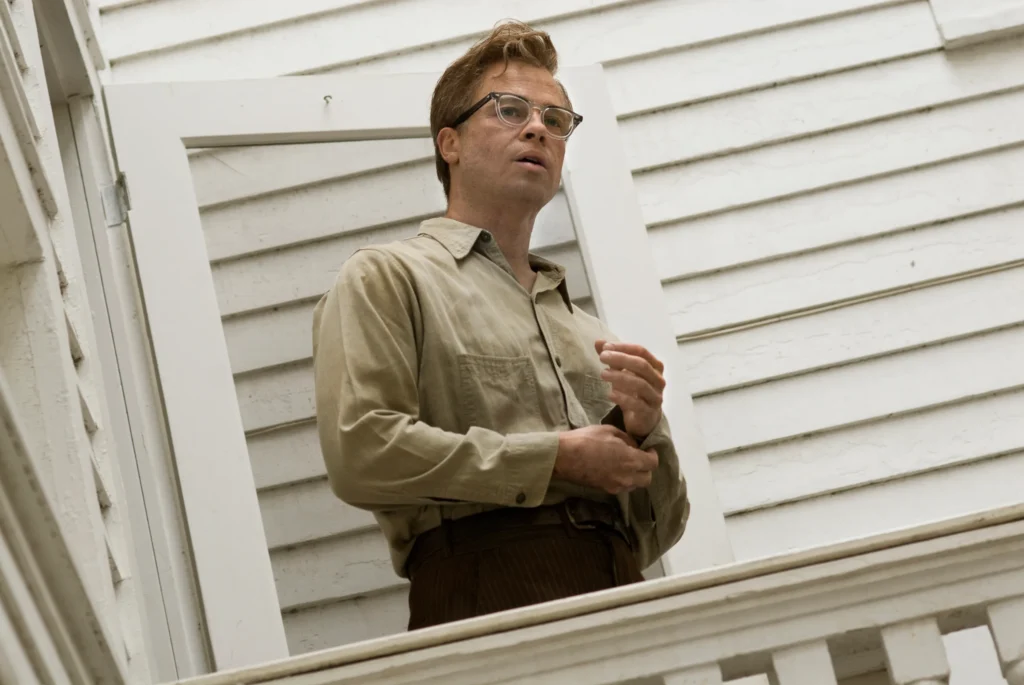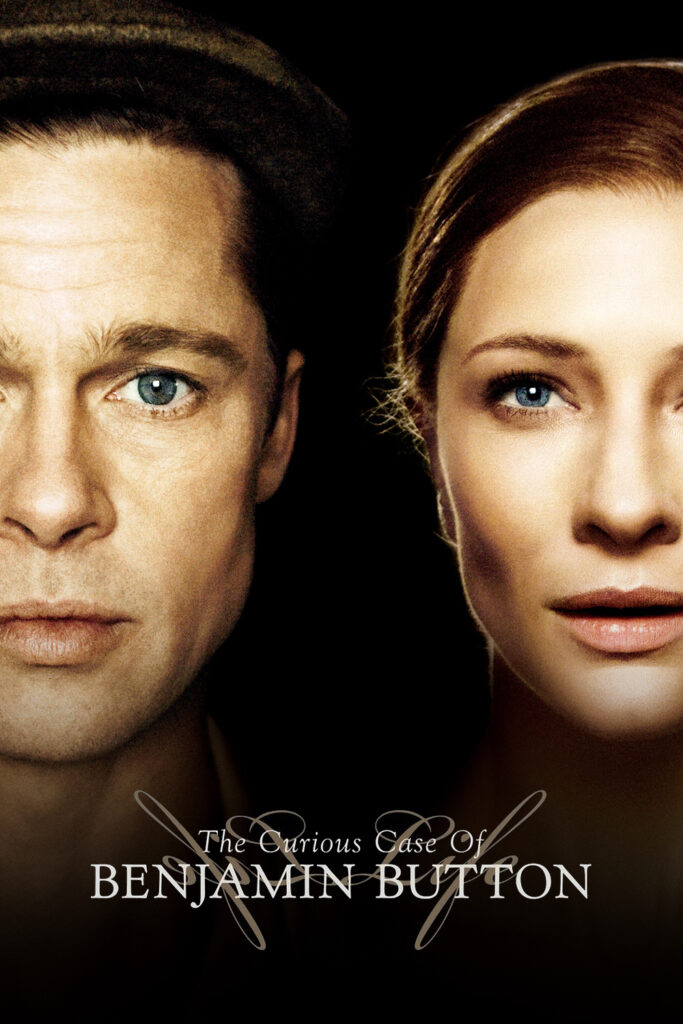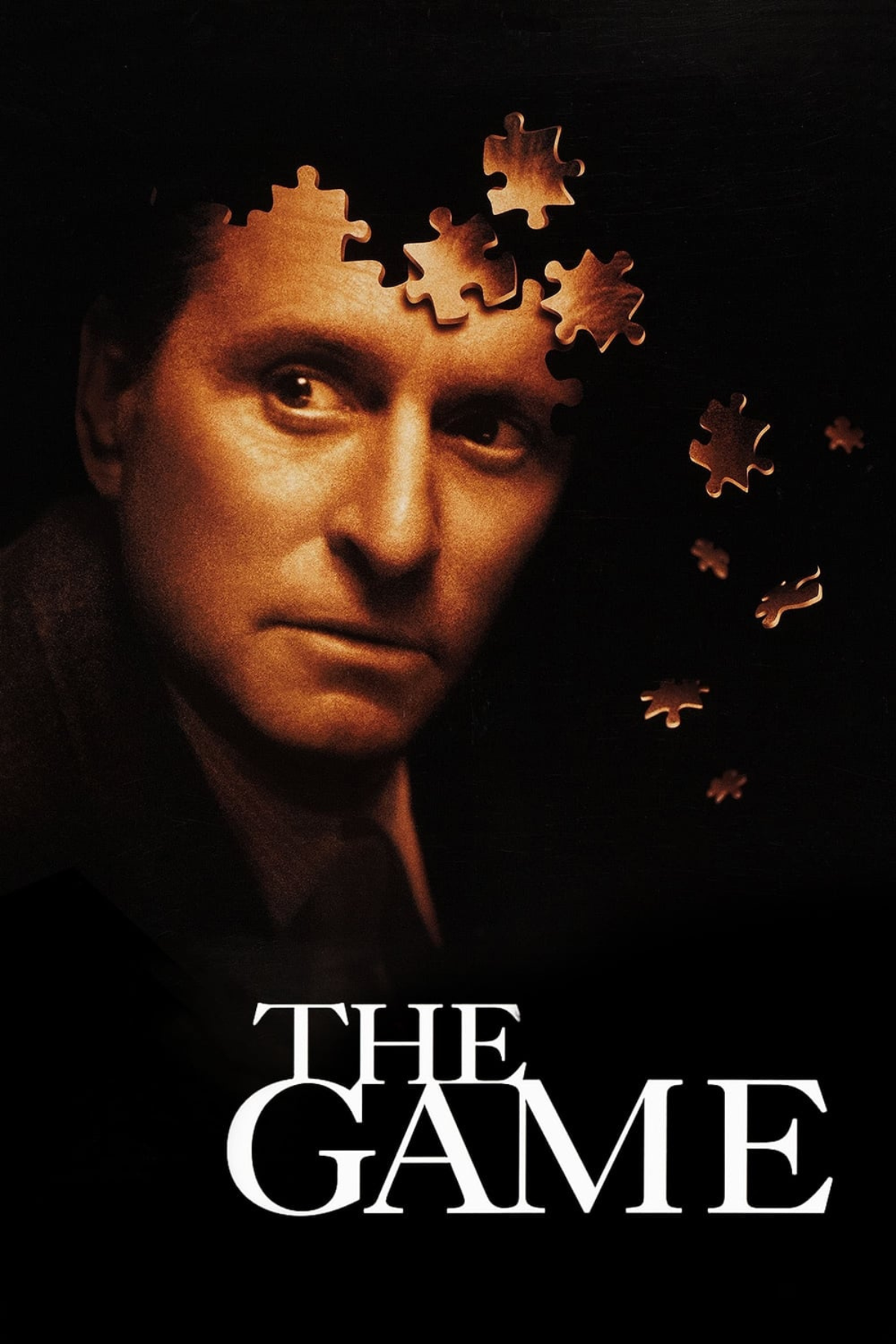The Curious Case of Benjamin Button Stars Brad Pitt and Cate Blanchett and is Directed by David Fincher
Review: The Curious Case of Benjamin Button introduces us to David Fincher in a seemingly softer, more empathetic guise. The movie is a sincere detour to the filmmaker’s career, one that is interesting to look back on years later. Brad Pitt delivers a performance that transcends technological constraints and unlikely subject matter.

The Curious Case of Benjamin Button Review and Rating
David Fincher’s filmography is a sprawling mosaic of darkness, obsession, and the intricacies of the human psyche. As a devout Fincher enthusiast, navigating his diverse portfolio feels like uncovering new layers of the same thesis, each film a distinctive marker in his evolution as a director. The Curious Case of Benjamin Button, however, stands as a unique anomaly within this arch—a film that, for me, has always been the most challenging to reconcile with Fincher’s filmography.
The film unfurls a tale both extraordinary and fantastical, adapting F. Scott Fitzgerald’s short story into a visually stunning exploration of life’s temporality. At its core, the narrative grapples with the peculiar case of Benjamin Button (played with poignant depth by Brad Pitt), a man born in his eighties who ages backward. While the film’s narrative framework is undeniably ambitious, it is precisely this ambitiousness that casts a shadow over the movie, leaving it suspended between the realms of sincerity and the unmistakable stylistic DNA of its director.
The Curious Case of Benjamin Button introduces us to David Fincher in a seemingly softer, more empathetic guise. The film’s sincerity is notably palpable, a departure from the director’s usual bleak and cynical portrayal of society. It’s speaks to Fincher’s versatility that he ventures into different source material and tones, yet therein lies the crux of my struggle with the film—it feels like Fincher dons the cloak of another filmmaker, one whose shoes don’t quite align with his own stride.
The most visually arresting aspect of the film, and perhaps its most divisive, is the extensive use of CGI to depict the titular character’s unconventional aging process. Watching Brad Pitt morph from elderly to infant and back again is an otherworldly experience that, while central to the narrative, inherently dates the film to the late 2000s era of experimenting with such technology. The uncanny valley effect is at play, making it a visual spectacle that elicits a mixture of awe and a tinge of discomfort. However, it is worth praising David Fincher’s skill because the CGI, while occasionally jarring, does not completely derail the film’s emotional resonance.
Brad Pitt, breaking through the confines of his own skin, delivers a performance that transcends the technological constraints. His portrayal of Benjamin Button is a masterclass in physical and emotional nuance, navigating the challenges of aging backward with a sense of mortality and vulnerability. The film truly finds its stride when Cate Blanchett takes center stage, imbuing the narrative with a magnetic energy that elevates it to new heights. Blanchett’s portrayal of Daisy, Button’s love interest, is a showcase of her emotionality as an actress, injecting vitality into the film’s emotional core.
Claudio Miranda’s cinematography is an incredible symphony of color and space, capturing each frame with a mesmerizing beauty that brings the world of Benjamin Button to life. The film’s visual allure is undeniable, offering a lens through which we peer into the world with a childlike sensibility, every scene infused with a sense of wonder. Yet, it is precisely in this visual splendor that we encounter Fincher’s struggle to reconcile the film’s worldview with his typically pessimistic and cynical lens on society.
Reviews for Movies Directed by David Fincher
Fincher, the maestro of bleak narratives in Se7en and the haunting ambiguity of Zodiac, seems somewhat adrift in the whimsical landscapes of Benjamin Button. The source material, with its fantastical premise and themes of love and mortality, feels like a deviation from the director’s established thematic terrain. While the film is undeniably a visual triumph, I cannot help but wonder if the intricate design and craftsmanship serve as a veil, concealing a narrative that lacks the depth and societal critique synonymous with Fincher’s best works.
Despite my reservations, it would be remiss not to acknowledge the film’s moments of emotional potency. The Curious Case of Benjamin Button has its share of poignant scenes that tug at the heartstrings, offering glimpses into the fragility of life and the transient nature of human connections. It’s in these moments that the film transcends its visual spectacle and taps into the universal themes of love, loss, and the inexorable march of time.
In the grand scheme of David Fincher’s filmography, The Curious Case of Benjamin Button stands as a unique entry—a deviation from the director’s thematic norms, a dalliance with fantasy, and a testament to his willingness to venture beyond his comfort zone. While an average Fincher film remains a solid entry for any other director, the film, for all its visual splendor, feels like an outlier, a beautiful diversion in a career defined by dark and intricate works.
I find myself torn between admiration for the movie’s visual prowess and a yearning for the thematic depth that defines Fincher’s best works. The Curious Case of Benjamin Button is a film that I like but don’t love, a testament to Fincher’s ability to craft a unique narrative even when traversing unfamiliar terrain.
Watch The Curious Case of Benjamin Button on Showtime and VOD
The Curious Case of Benjamin Button (2008) Film Cast and Credits

Cast
Brad Pitt as Benjamin Button
Cate Blanchett as Daisy Fuller
Taraji P. Henson as Queenie
Julia Ormond as Caroline Fuller
Jason Flemyng as Thomas Button
Mahershala Ali as Tizzy Weathers
Elias Koteas as Monsieur Gateau
Tilda Swinton as Elizabeth Abbott
Crew
Director: David Fincher
Writers: Eric Roth, Robin Swicord, F. Scott Fitzgerald (Original Writer)
Cinematography: Claudio Miranda
Editors: Angus Wall, Kirk Baxter
Composer: Alexandre Desplat
Classic Movie Reviews from Cinephile Corner
- The Exorcist Review: William Friedkin Redefines Horror with 1973 Classic Possession Movie
- Grand Illusion Movie Review: A Prescient Anti-war Film in the Canon of Cinema
- WALL-E Movie Review: A Pixar Magnum Opus in Visual Storytelling
- Ratatouille Movie Review: Brad Bird Directs the Most Unique and Beautiful Pixar Film Imaginable


